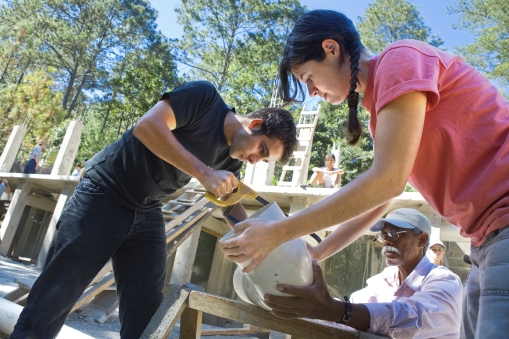COVER STORY

College of Engineering students Daniel Menndez 08, left, and Nicole Ceci 08 work on a PVC pipe at the Marcala water treatment plant site with Jorge Dueas, right, a local Honduran who helped organize the AguaClara trip to Honduras in January 2008.
Cornell's global citizens roll up their sleeves and tackle real-world problems
During the rainy season in Honduras, the tap water would run brown in the house of the local family where Heather Reed '10 stayed in early 2008. Now the water runs clear, thanks to AguaClara, a Cornell engineering class project aimed at designing low-cost water treatment systems that operate without electricity. The gratitude the residents have expressed is "motivation for us to come back and work as hard as we can to make those plants more efficient and inexpensive," says Reed.
Anna Herforth, a Ph.D. candidate in Cornell's Division of Nutritional Sciences, recalls the afternoon she spent in 2007 helping Masai women in Kimnyak, Tanzania, thatch the roof of their house with local grasses. She was in Tanzania doing a survey on nutrition, but spending time in the communities where she was studying, she says, "lent an invaluable perspective to understanding the context in which the crop and food decisions were taking place."
Last winter, five Cornell undergraduates distributed and treated anti-malaria bed netting in Hujimbre, Ghana, while also providing malaria-prevention education and collecting data for a malaria intervention service-learning course. "I want to make an impact, not necessarily in the short term, but over the long term to prevent malaria and empower the local Ghanaians to fight malaria," says Joseph Agyei '11, a Ghanaian citizen studying policy analysis and management at Cornell, who participated in the project.
Despite its location in upstate New York, Cornell's view is global, with students and researchers traveling far afield to work in the developing world. Cornellians are leveraging their resources to tackle some of the world's most pressing problems in agriculture, health and population growth.